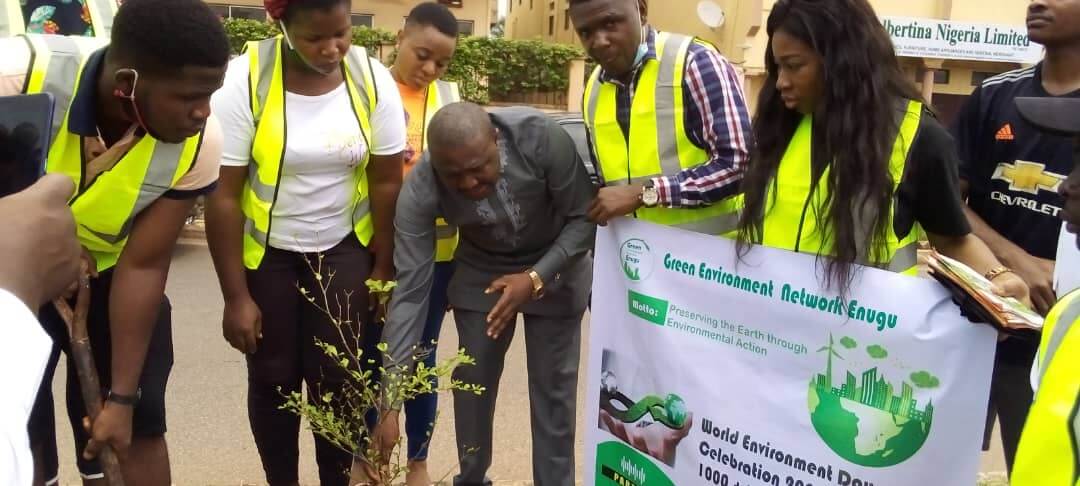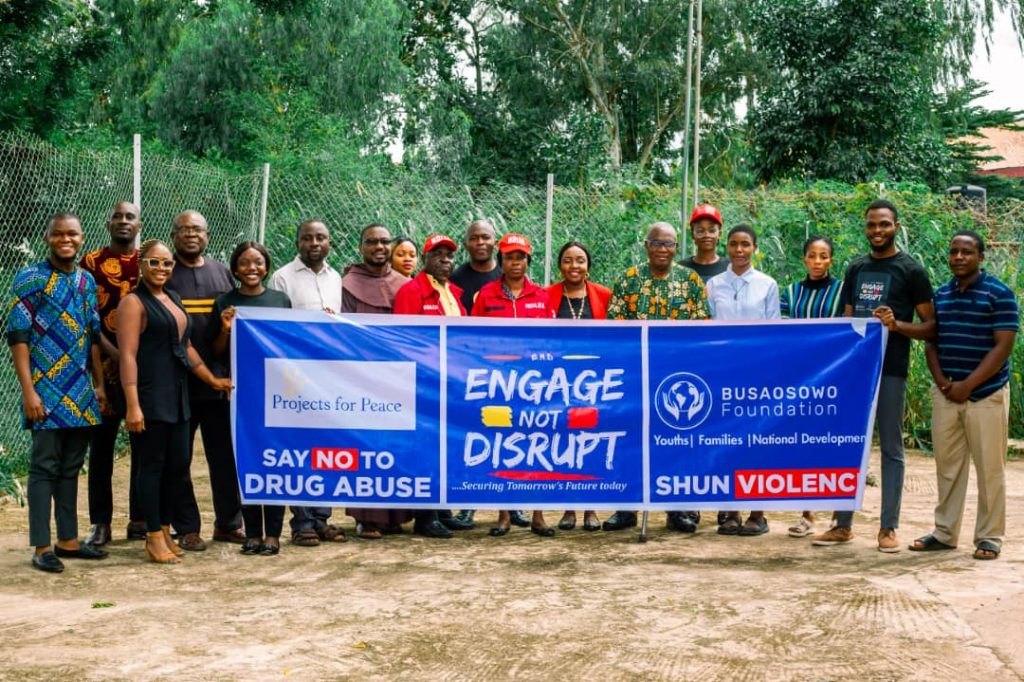World Environment Day 2020: How young Nigerians are matching words with action to save the earth

By Ikenna Ugwu
“The best friend of earth of man is the tree. When we use the tree respectfully and economically, we have one of the greatest resources on earth” ~ Frank LIoyd Wright.
All over the world, young people are taking responsibility and responding to the urgent call for quick action against rising climate changes. With 16% of the world’s population consisting of young people aged 15-24 (World Youth Report), it is increasingly apparent that young ones must refuse to be just beneficiaries but take charge of their future, starting with raising their voices on the global climate crisis.
This was how Green Environment Network, Enugu began – raising voices for environmental sustainability.
But the issue as critical as environment and climate change does not end at raising voices. Talk, the say, is cheap, after all. Young people must be able to support government to match words with action and become the solution to our changing world.
This is the mindset of the Chairperson and Coordinator of Green Environment Network,Enugu, Daniel Onyedikachi Ugwu (PhD). He believes young people are most times misconstrued as “problems to be solved”.
The Green Environment Network, Enugu, is a network of progressive, passionate and committed young people taking action to protect and “preserve the environment through environmental actions.”
Initiated in December last year as “Friends of the Environment, Enugu”, the network has transformed and grown with hundreds of volunteers, young people taking action for environmental sustainability.
Where the Network is coming from
A group of young environmentalists in Enugu under the Green Environment Network, Enugu had a “Green Hangout” event in February 2020 with key resolutions to “embark on tree planting within the Enugu metropolis…” This decision was made after duly analyzing the environmental importance of trees and the negative impact of cutting down existing ones due to urbanization.
And the understanding that the trees beautifies the roads and give shade to pedestrians and motorists, take out a large chunk of carbon dioxide which we produce from breathing, burning of fossil fuels and from poorly disposed wastes within the city.
The pilot phase of the project was to take off in May, 2020 (but for the obstructions caused by the COVID-19 pandemic) along the stretch of Zik Avenue and Agbani Road, Enugu state which were carefully selected because of the unique and strategic positions in the coal city. These areas contribute a lot to the carbon footprint to the state due to their population density and commercial activities and also are worse hit by negative effects of environmental pollution and
degradation. This idea of planting trees in these parts of Enugu was to help the state to achieve part of the Sustainability Development Goals number 13 (Climate Action) and 11 (Sustainable cities and communities) respectively.
The Action
On June 5 – in commemorating this year’s World Environment Day — the network is matched words with action, kicking off a historic campaign to plant 1000+trees in the metropolis.
Interestingly, the Network has been able to attract the support and partnership of Enugu state government in promoting environmental sustainability in the state. To this effect, the flag-off of the tree-planting campaign was attended by top government officials including the state Commissioner for Environment, Hon. Chijioke Edeoga, the Senior Special Assistant to the governor on environment, Chief Oscar Ikeogu, representative from Albertina Nigeria among other dignitaries.
This union between the Green Environment Network, Enugu, the state government and other stakeholders underscore the intent of the government and her people to improve the environment status of the state and speak volumes of the viability of public/private partnership in addressing pressing environment issues.
In the build up to the tree-planting flag-off, the Network has also leveraged on her good media relationship with her media partners; Radio Nigeria Coal City FM, Dream FM, Solid FM, Urban Radio among others to educate and enlighten the public on the adverse impact of poor solid waste management, pollution and other environmental practices that does not support healthy living.
The Network wrapped up the World Environment Day celebration with a webinar on the topic: Biodiversity; the impact of poor waste management on ecosystem. The webinar had over hundred and twenty people in attendance.
Sustainability plan
One of the interesting things about the actions of the Network is that they are not just planting the trees. They have worked out sustainability ideas to ensure that the planted trees are protected and preserved. It is on this note, that the residents of the catchment areas are being sensitized and encouraged to not just take part in the planting exercise but to personally and collectively own, water and nurture the trees planted to maturity. This way, community ownership of the project and the survival of the planted trees is ensured.
Why we are taking action for the environment
We believe that we must not just act. We have to act now! Time is important and the time is NOW! Warm weather is increasing the number and range of ticks, midges, and mosquitoes–those that carry human disease, such as dengue fever, and those that don’t but still kill wildlife and livestock. Crop-damaging pathogens are spreading, threatening food security.
Delaying efforts to mitigate either carbon dioxide or short-lived climate pollutant emissions will have negative, and potentially irreversible, consequences for global warming, rising sea levels, agricultural yields, and public health both in the state and globally. Experts believe that due to their relatively short lifetime in the atmosphere, ranging from a few days to a few decades, short-lived climate pollutants respond very quickly to reduction efforts. This means that if we act fast to reduce these pollutants, it is likely that we could cut methane emissions by 25% and black carbon by 75%, and eliminate high-global warming potentials.
According to Climate and Clean Air Coalition, quick actions taken can help us avoid an estimated 2.4 million premature deaths from outdoor air pollution annually by 2030; slow increase in near-term global warming by as much as 0.6°C by 2050, prevent climate tipping points that can exacerbate long-term climate impacts and make adapting to climate change harder, especially for the poor and most vulnerable.
Why we are calling on more young ones to take action
In 2015, UN Secretary General Ban Ki-moon remarked that “we are the first generation that can end poverty. We are also the last generation that can slow global warming before it is too late.” Responding to this remark, while climate activism and advocacy has tremendous increased, the world battling poverty, diseases and other global challenges occasioned by global warming.
Fortunately, youths constitute the majority of the population in many countries and have an increasingly strong social and environmental awareness, which has the power to transform our societies towards a low-carbon and climate resilient future.
Today, there are more than 1.2 billion young people aged 15 to 24 years, accounting for 16 per cent of the global population (World Youth Report, 2018). It means that the active engagement of youth in sustainable development efforts is central to achieving sustainable, inclusive and stable societies and cannot be ignored if we must avert the worst threats and challenges to sustainable development, including the impacts of climate change.
Moving forward
We understand that the effort of youth is crucial to raise ambition of governments and other stakeholders to come to expedite and coordinate actions on climate change. We must strengthen both formal and informal education on environment and climate change and sustainable lifestyles. In addition, sustainable production and consumption patterns must be promoted and youth supported as environmental champions in their local communities.
Written by Ikenna Ugwu, a social impact writer and member, sustainability advocate and member, Green Environment Network, Enugu. Ikenna Ugwu tweets @Drevscourt Email: [email protected]


